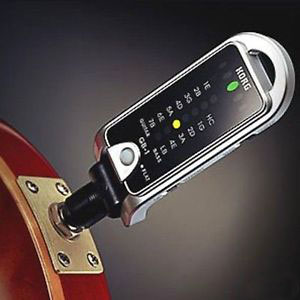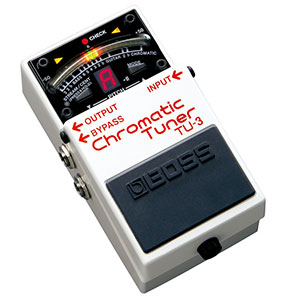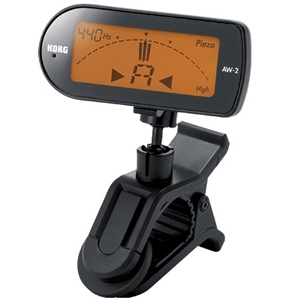- Home
- Instruments
- Gear
- Recording
- Lessons
- Reviews
- Blog

Tuners are an essential piece of gear for any guitar player. If you don't know what a tuner is, or how important it really is, check out our article ‘Just How Important Are Guitar Tuners' that answers those questions in detail. Unless you have the ridiculous talent of recognizing every single note by ear, along with the octave it's in, you will want to have a tuner by your side. Speaking of which, there are many different types of tuners out there. They all perform the same task, but the do it a variety of different ways.
Our mission today is to discuss different types of tuners and see which ones are most effective, and which ones are most accurate. While it's true that any kind of tuner is better than no tuner at all, if you already have the ability to choose, you might want to get something that will serve your particular setup the best.
 There are generally two main types of guitar tuners, the ones you plug your guitar into, and ones you don't. The former comes in various shapes and forms. For example, you have quite simple battery powered tuners that you can pack in your guitar bag and have with you at all times. When you need to use them, just plug the guitar cable leading from your instrument into that tuner, and look at what it shows on the display.
There are generally two main types of guitar tuners, the ones you plug your guitar into, and ones you don't. The former comes in various shapes and forms. For example, you have quite simple battery powered tuners that you can pack in your guitar bag and have with you at all times. When you need to use them, just plug the guitar cable leading from your instrument into that tuner, and look at what it shows on the display.
These are great for tuning a guitar before you playing, but that's about it. If you need to check your tuning in the middle of a performance, you will have to unplug the guitar and repeat the process we mentioned earlier. Needless to say, this type of tuner is not very effective on the fly.
 The other type of tuner that requires you to plug your guitar into it comes in form of a pedal. What's great about this design is that you can add it to your signal chain, before all of the effects pedals, and use it whenever you need to. On stage, during a performance, you name it. This is what pros use most of the time as it doesn't require them to unhook anything, and they can be activated by a simple press of the foot switch. The only ‘issue' with a pedal tuner is the price which is often higher.
The other type of tuner that requires you to plug your guitar into it comes in form of a pedal. What's great about this design is that you can add it to your signal chain, before all of the effects pedals, and use it whenever you need to. On stage, during a performance, you name it. This is what pros use most of the time as it doesn't require them to unhook anything, and they can be activated by a simple press of the foot switch. The only ‘issue' with a pedal tuner is the price which is often higher.
When it comes to tuners you don't have to have your guitar plugged into, there are several different versions as well. The most common one uses a microphone to figure out what pitch the strings are in. This type of tuner has limited practical value. For one, it requires absolute silence to work properly.
If you are trying to tune your guitar in an area that has a lot of background noise, you will get a whole bunch of false readings that will prevent you from tuning your guitar. This type of tuner is what you will see most acoustic guitar player use simply because they don't have a way to plug their guitar into anything, let alone a tuner. However, there is a better solution.
 The next type of tuner doesn't rely on the sound of the instrument, but rather the vibrations of the strings. These are mounted on the headstock of the guitar, and can be pretty accurate even if the environment around you is loud. You can use this type of guitar tuner to tune any kind of guitar. These are definitely more expensive than the standard tuner, so keep that in mind.
The next type of tuner doesn't rely on the sound of the instrument, but rather the vibrations of the strings. These are mounted on the headstock of the guitar, and can be pretty accurate even if the environment around you is loud. You can use this type of guitar tuner to tune any kind of guitar. These are definitely more expensive than the standard tuner, so keep that in mind.
Lastly, we have some pretty advanced forms of guitar tuners. One that comes to mind is a tuning peg block that contains an automatic tuner. You will see a little control cluster on the back of the headstock which allows you to choose which tuning you want, and all you have to do is press the button.
Strum the strings once or twice, and the tuner will recognize the pitch. What happens next is borderline magical. The pegs are powered by electric motors, so they will start to spin on their own until the tuning is achieved. This whole process only takes a couple of seconds and is completely effort-free. Unfortunately, this space magic costs a lot of money. So much that a system like this can cost more than a decent guitar.
What we talked about in this article are the main types of tuners that you can currently find on the market. There are more versions than just the ones we have mentioned, but those are not that popular. When you go shopping for a tuner, the first and only real requirement needs to be sonic accuracy. Everything else comes at a distant second place. As long as you can find a reliable and accurate tuner, you are set to go.
With all this stuff out of the way, feel free to check out our rundown of Best Guitar Tuners on the market today.

Thomas Steven says
Having the ability to recognize the notes by ear isn’t a ridiculous talent. Duh!